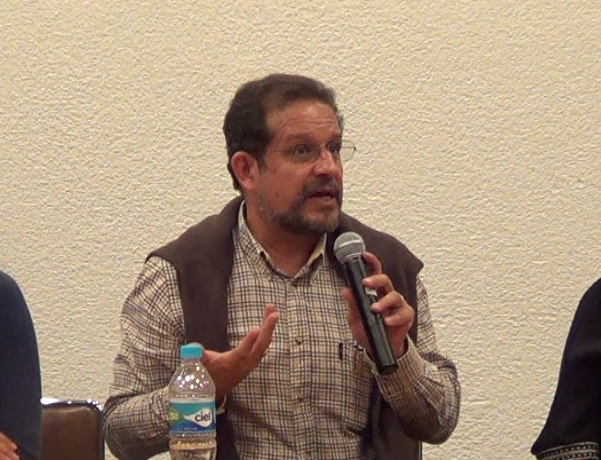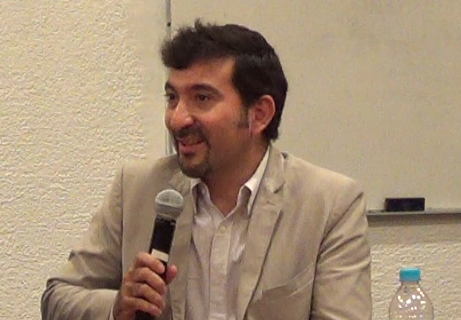Team:UNAM Genomics Mexico/HumanPractices/Round Table
From 2012.igem.org

Symposium on Science Communication
Every stage in a project must come to a closing. The same way all of our favorite TV shows have Season Finales, our Human Practices project came to a "season finale " with an event that congregated several personalities at the local and national level to discuss the issues we addressed throughout this year.
This event was a Symposium on Science Communication called "Perspectives on Science Perception and Communication", held at the Auditorium of the Center for Genomic Sciences on October 23rd, 2012. This symposium consisted of the following activities:
- 1. Inauguration by the Minister of Innovation, Science and Technology of the State of Morelos, Mexico, Brenda Valderrama.
- 2. Presentation of the Bacillus Booleanus project by our Team Members
- 3. A brief recess to allow the atendees of the Symposium to see the BioSintetizARTE exposition
- 4. A Panel about Science Communication and Perception with noted science communicators, scientists and representatives of the society.
Foreword by Brenda Valderrama
 Minister of Innovation, Science and Technology of the State of Morelos, Brenda Valderrama |
The Minister of Innovation, Science and Technology of the State of Morelos, Mexico, Brenda Valderrama, attended our event and commented on the actions taken by our State's government on the area of Science and Technology. She mentioned the need to close the links between different players in the field of Science and Technology, ranging from those scientist doing basic science, translational research and technological innovation. But she also stressed the necessity to transfer basic knowledge to the general public, and mentioned that a third of the Development Plan of her Ministry is devoted to the diffusion, communication and appropriation of scientific knowledge by society.
Among the plans the Innovation, Science and Technology Ministry has to promote the field of Science Communication, the State will promote the existing instruments already in place as the Museum of Sciences of Morelos and the great number of scientists in the State towards the creation of the Morelos's Center for Science Communication, a top notch center devoted to the task of outreach.
After she delivered her foreword, minister Valderrama inaugurated formally the symposium.
Presentation of the Project
We presented our project to the attendees of the symposium, giving special emphasis to our Human Practices project. Here are some pics:
 Jonathan, explaining the AND part of our project |
 Laura, explaining the work done in Bacillus subtilis |
 Diana, presenting our Outreach videos |
 Abiel, presenting about perceptions of scientists |
BioSintetizARTE exposition
We also mounted the BioSintetizARTE exposition so the attendees of the symposium could appreciate the results of the call we made. Here are some pics of some of the attendees enjoying some art:
 |
 |
Round Table
The main activity scheduled in our symposium was a Panel where noted personalities shared with us their points of view on the activities we preformed for our Human Practices project.
Our guests to the Panel were:
- Julia Tagüeña Parga, Member of the Mexican Society of Science and Technic Outreach and former director of the Science Museum Universum, and researcher at the Center for Energy Research.
- Alejandra Zayas del Moral, president of the non-profit organization Más Ciencia por México
- Martín Bonfil Olivera, one of the most known science communicators in Mexico, who is also member of the Mexican Society of Science and Technic Outreach and te General Direction of Science Communication of our University
- David Romero Camarena, director of the Center for Genomic Sciences.
- The Panel was moderated by José Antonio Alonso Pavón, our Human Practices Advisor.
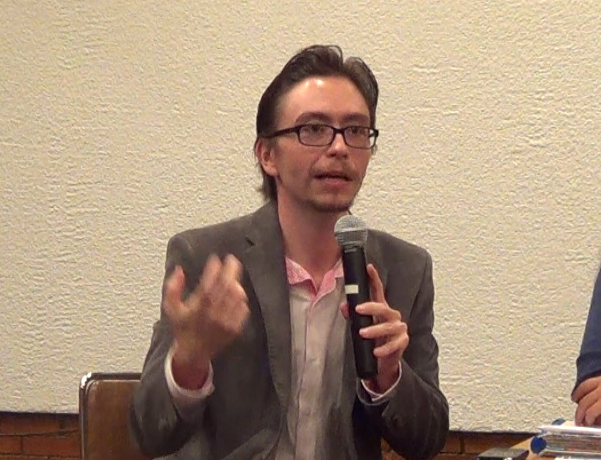 Our Panel's moderator, José Antonio Alonso |
The Panel discussed three main issues in Science Communication and Science Perception. The most relevant and interesting ideas are shared below.
The first issue addressed in the Panel was the perception of Scientists as people detached from society and it's needs. Following the Victor Frankenstein's analogy, we asked our panelists about their thoughts on the issue of science communication, and whether there should be a duty to build a bridge between the scientific community and society.
Julia stated that there is indeed an obligation to have a meaningful outreach to society, although she recognized that there are scientists that have the gift to communicate the ideas clearer and more effectively. She quoted one of the pioneers in Science Communication in Mexico, Luis Estrada, to support this idea: "If Science communication has to be done, let it be done by those who know how to do it, regardless of who they might be".
It is well known that there are scientist that are not as gifted as others to create these bridges with the community since their skills might not be sufficient to grasp the attention of the public. Nevertheless, as Julia said, there are still the multidisciplinary groups created to help them in this particular task. To that matter, she suggested that scientist could involved an effective communicator and collaborate with others to have a meaningful communication with society, as some scientists have done with the Science Museum of the National Autonomous University of México Universum.
For his part, Martin stressed the necessity of a bidirectional process, where not only scientist recognize the compromise to share, communicate and democratize scientific knowledge, but also acknowledging that as citizens and members of the community we have an obligation to be concerned about the progress and direction of scientific process, funding and uses of scientific results. He talked about the evolution of science communication, where in the beginning there was a disdain for the idea of putting the scientific knowledge in the hands of lay people, an idea that has been progressively disappearing but that some scientist still hold. In that context, science communication plays a paramount importance: transmission of knowledge and making people interested, wich eventually will lead them to ask for more information, making science a more democratic process, so that our culture turns to be also a scientific culture. To achieve this, he pointed the recent use of the social networks to achieve a dialogue with those who receive communication, and starting a dialogue with them.
David acknowledged that there are a lot of scientists that indeed lack the ability to transmit the concepts behind their works in simple words adequate for the general public. He noted that during scientific formation, several of these scientists lose the ability to talk about science in a simple way, and that they transmit this inability further to their students. Therefore, David pointed that there's a need for better means of science communication, not only for the general public but also for the scientific community, because as scientists we also need to know what is being done by others within Mexico and outside the country. This means that scientists need to stop considering outreach as a secondary activity.
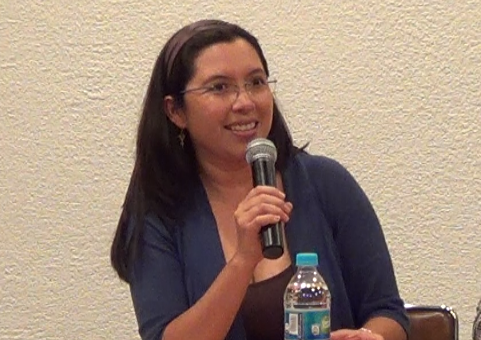 Alejandra argued that science communication starts at home: How do you explain your family what you do? |
Alejandra closed this section of the panel stating that our outreach experiences start at home. She shared the experience of many students of the areas of genetics and molecular biology, when they have to explain in simple words what they do to their families (and specially when their families are not acquainted with basic concepts in biology). In the end, our main goal according to Alejandra is to create interest in those people who prefer watching noneducational contents on the TV or would rather read an exaggerated story in the newspaper instead of science outreach material.
For the second issue discussed during the panel, our moderator returned to the idea expressed by Martin regarding the bi-directionality of the communication process. At this moment, José Antonio explained the way we conducted our talks, the philosophy behind the BioSintetizARTE call, and asked the panelists how can we achieve a meaningful correspondence where there's a complete feedback for us as scientists on what is concerning society members.
The first one to talk was Julia, who praised the work made by our team since she had the opportunity to attend one of the talks we have delivered. She noted that the design of the talk was very effective since we started our talk not giving "rough data" about biology, by debunking the preconceptions about genetically modified organisms. For someone who is not an expert in the field, it would appear that the modification of nature is a recent phenomenon, something that scientists invented in recent years. Our talk contextualized
According to Julia, there's a lot of research needed in Science Communication. She explained that Science Communication has a practical side: delivering talks, for example. But there's another side that has been forgotten for many years: there's a lot of research needed in cognitive processes, sociological influences in communication and many other things that can shed light into how can we create a better communication.
Martin commented on the enormous challenge upon the communication of complex issues such as Synthetic Biology, and since there needs to be a basic set of concepts in biology, genetics, computation and engineering that most people lack. Therefore, he expressed that most of the outreach done about Synthetic Biology has to be done in an experimental way, finding eventually a good formula to make the concepts simple enough to be appropriated by the public. Furthermore, topics such as the modification of nature need to be communicated in a very well thought manner, since they are controversial topics that require to be addressed carefully
David shared an experience he had addressing a controversial issue such as transgenic plants. When he was asked by a friend of his to deliver a talk on the topic, he told us how he arrived to the venue with a bag full of fruits and vegetables he had bought on the market, and started the talk asking the public which one they though it was the "natural", or wild-type, form of food. The answer was none, since all of them had been modified one way or the other. This strategy, as he noted, also helps to fight the preconception.
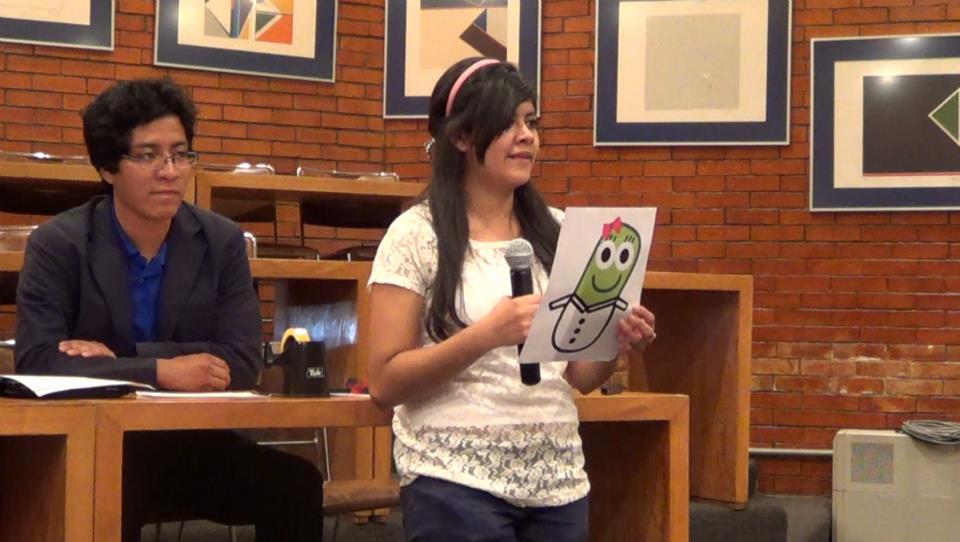 Laura presented the justification behind the idea of our "mascot", Mrs. Lupita Cohnnie, PhD |
Another experience David shared was the use of popular culture items to address scientific concepts. He argued that using movies, for example, is a great way to grasp the audience attention, since those are familiar thing to the general public. Alejandra, in her participation, agreed that popular culture such as movies are an excellent way to achieve a meaningful outreach, and added that independently of the method used, another thing that must be considered is the level used to address the audience: it is not the same to talk to children than to talk to adults, or people living on urban areas than people from rural areas. After the panel's participation, our moderator commented that popular culture is also a great way to communicate philosophical concepts in Bioethics.
For the last part of the panel, Our moderator invited a team member, Laura, to present the justification behind our gender equality project embodied in Mrs. Lupita Cohnnie. After her presentation, the panel commented on the issue.
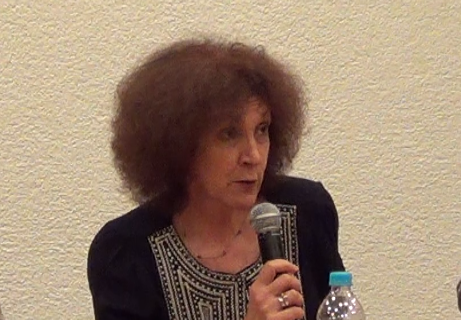 Julia Tagüeña insisted that Science should be gender neutral |
Martín expressed that he liked the idea, but rapidly conceded that Julia had more expertise on the topic and gave her the opportunity to talk. Julia expressed that we need to forget the differences and start thinkning that Science is gender-neutral, or at least it should be. She mentioned that Mexico situation is better than other countries, since the discrimination phenomenon is not as strong as it is in other countries. Although Julia indeed said that discrimination occurs not only for gender, but many other circumstances, David argued that we shouldn't put our guards down. David focused on the issue of maternity leaves in science, and how women have a burden on them when they have to choose between a career and a family, given the way the scientific job market is structured. David applauded, for example, recent changes in the way the National Researchers System incorporates new members, giving women additional time to formalize their careers and organizing their lives without the burden of deadlines and age limits. But David also commented that this is not enough, since generally (not always, but most of the times) to create a family two are needed, and therefore women's issues need to be considered more like family's issues instead. Julia commented that in her experience, many female students approach her to ask whether to pursue a career or a family, and how difficult can it be; she told us that her answer is always "choose your partner wisely". Alejandra, in turn, acknowledged that the problems exists and that they're not exclusive of the scientific community, but agreed that the phenomenon is not as widespread within it.
Concluding Remarks
To achieve a meaningful communication, several things must be taken into account. Creating integral projects that consider not only the transmission of concepts, but also incorporate artistic expressions, new ways to get to the people's minds, and creating a meaningful dialogue.
Martín concluded our talk with an excellent summary of the things that are needed to have a successful outreach:
- It has to be scientifically accurate
- It has to be clear
- Last but not least, it has to be interesting
And yet, in order to achieve clarity and catch the public's eye, sometimes you have to sacrifice a little bit of accuracy in the way. While this might seem problematic, it's better to get people's attention with an incomplete scientific accuracy (that it's not the same than giving false information) and get into the details once the public is interested, than not having a public at all.
The ideas shared by this panel have proven to be of the highest relevance to our future projects, and we will be incorporating them accordingly. From this page, we want to thank all of them for their valuable insights and support, and we want to do the best we can so we don't let them down.
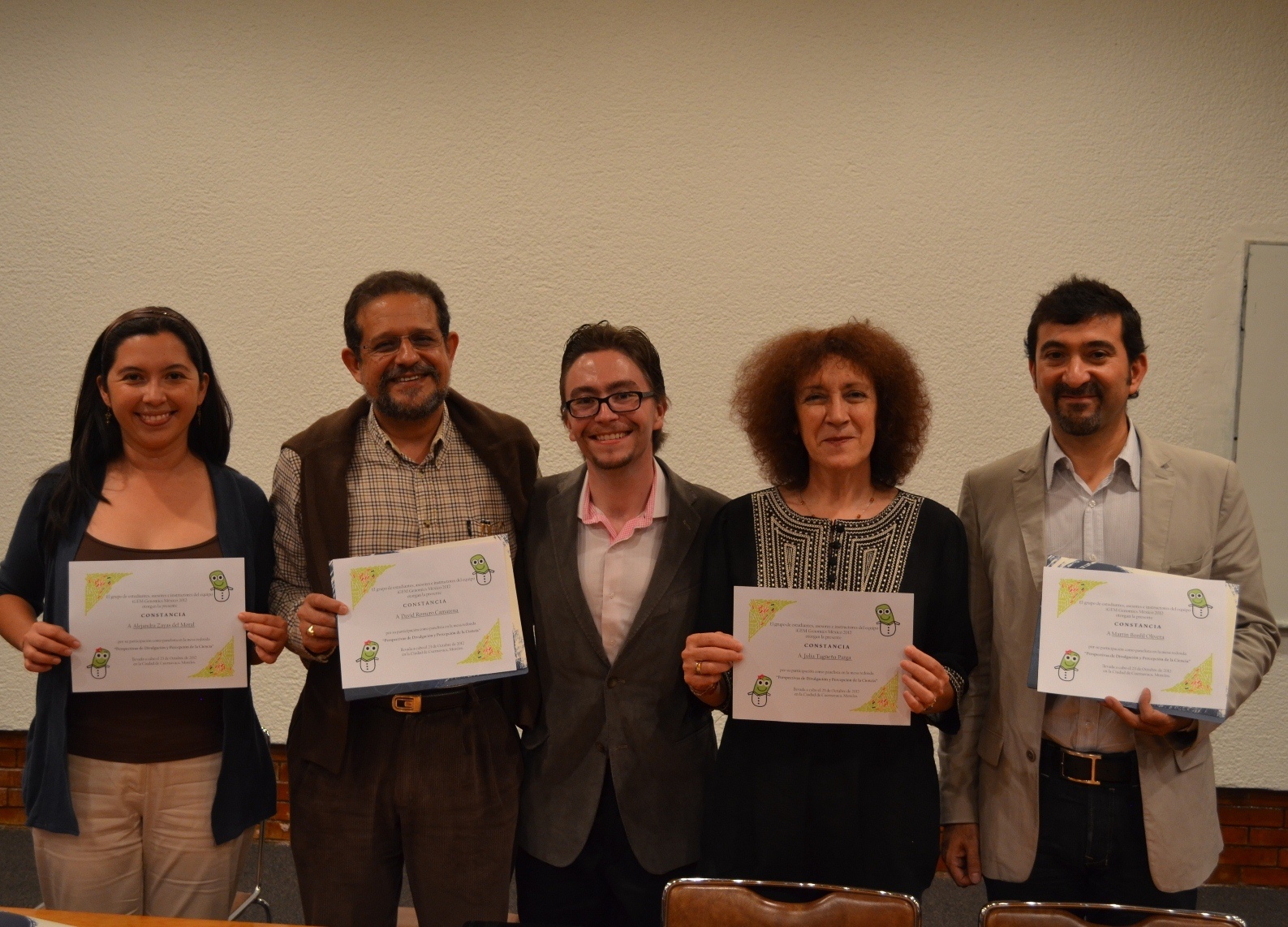 Panelists and moderator, after the event |
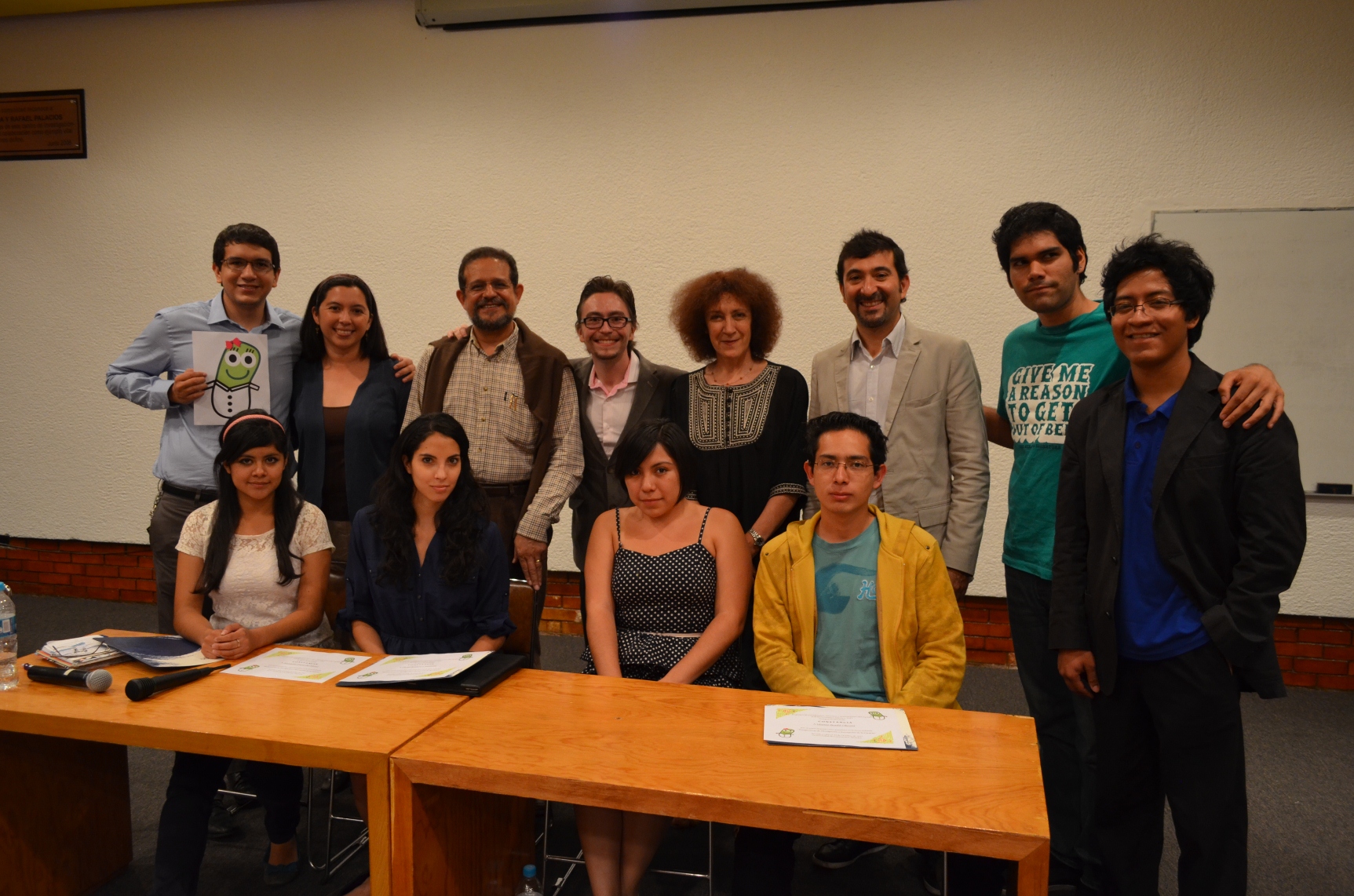 UNAM Genomics Mexico iGEM Team with our panelists |
 "
"













